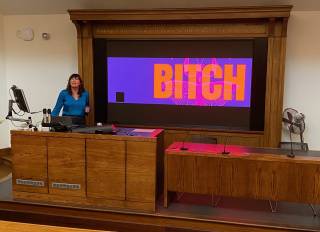Associate Professor Nazif Alic shares some of the progress that’s been made to address gender equality in UCL Biosciences, and how those actions are now being directed towards race.

“Many of the challenges we are facing globally are either generated or made worse by inequalities.
I see it in my research into ageing and longevity all the time, where we can identify major differences in health outcomes in different populations. For example, if you live in a deprived area of Glasgow, your health will be significantly poorer and your lifespan shorter than someone living in a wealthy part of the city.
Such differences don’t have anything to do with an inherent biology, they are a result of socio-economic determinants including racism. Or to put it more bluntly, you’ll be less healthy because of racism. And that runs through many, many other issues too, of course, like climate change, which as we all know will have a noticeably greater impact on poorer countries.
I’ve been at UCL since 2006, as a post-doc and then a research fellow and lecturer, so I have seen the university from many different perspectives and angles. It’s motivating and encouraging to see the increased focus on equality and diversity, and it’s something I’ve been actively involved in, first through Athena SWAN and more recently, in helping to set up our new Race Equity Committee for UCL Biosciences.
As a teenager, I was a refugee from Sarajevo, Bosnia and Herzegovina, so I know what it feels like to be on the outside, and I am not sure that feeling ever fully disappears, but one can learn to use that energy for something positive.
For me, being involved in EDI is essentially about wanting to play my part, however small, in moving academia that bit closer towards equality. As members of the Faculty, we’re all invited to become involved in citizenship, and I regard my EDI work as one of the most rewarding things I spend time on outside my teaching and research.
The lack of gender parity in academia is of course well documented, and Athena SWAN has done a good job of formalising the work to tackle that, and making it easy for people to participate in. As part of the Biosciences team looking at this area, I’ve helped to roll out many of the actions we’ve introduced in our efforts to tackle gender inequality issues.
We’ve looked at how we can better support people with caring responsibilities, and improve the way we recruit, retain and promote women at senior levels. There’s still a way to go to achieve gender parity but we’re making progress. For example, We went from 19% women in senior roles in 2011 to 28% in 2021, so we are moving things closer to where they need to be. It’s also important to look at how we improve culture, inclusion and belonging for every person we recruit and promote, irrespective of their gender, beliefs or background.
The next big stage for us is to take some of the actions we know have worked well with Athena SWAN and apply those to race. With the murder of George Floyd and the Black Lives Matter movement galvanising universities into much-needed action in 2020, we set up a dedicated Race Equity Committee in UCL Biosciences.
To date, Athena SWAN has largely focused on gender, and less on the intersectionality of gender with race or other protected characteristics. We have to ask: has it had a positive impact on the working lives of BAME as well as White women?
In truth, racial equality has been looked at much less. We need to address that now to encourage more non-White academic staff into the division. How can we support those staff to succeed? How can we encourage more speakers from different backgrounds to talk at our events? Last year, we had 20% non-White speakers. We want to get that up to 40%, to be much more closely aligned with London’s population. Then there’s the awarding gap for BAME students, which we’ve started doing some good workaround, too, in particular by helping students develop a growth mindset.
A big challenge with all of this, of course – in a division of our size – is institutional inertia. We need a lot of people to engage, to change the way they’re thinking, the way they are doing things. And for academic staff who have a lot on their plates, this can feel like additional work. So it’s important the impetus is there at different levels, to keep engagement high.
Ultimately, we’re all here to do research and to teach – and we want our research to be relevant to as many people as possible. A diverse workforce is more innovative, more resilient. And our teaching needs to be equitable and suitable for today’s world.
So I would urge people to get involved in as big or small a way as they can – and not to give up. These issues affect all of us, not just those deemed as ‘outsiders’. We all have a part to play.”
Links
Athena Swan in UCL Biosciences
Biosciences Race Equity Committee
 Close
Close


